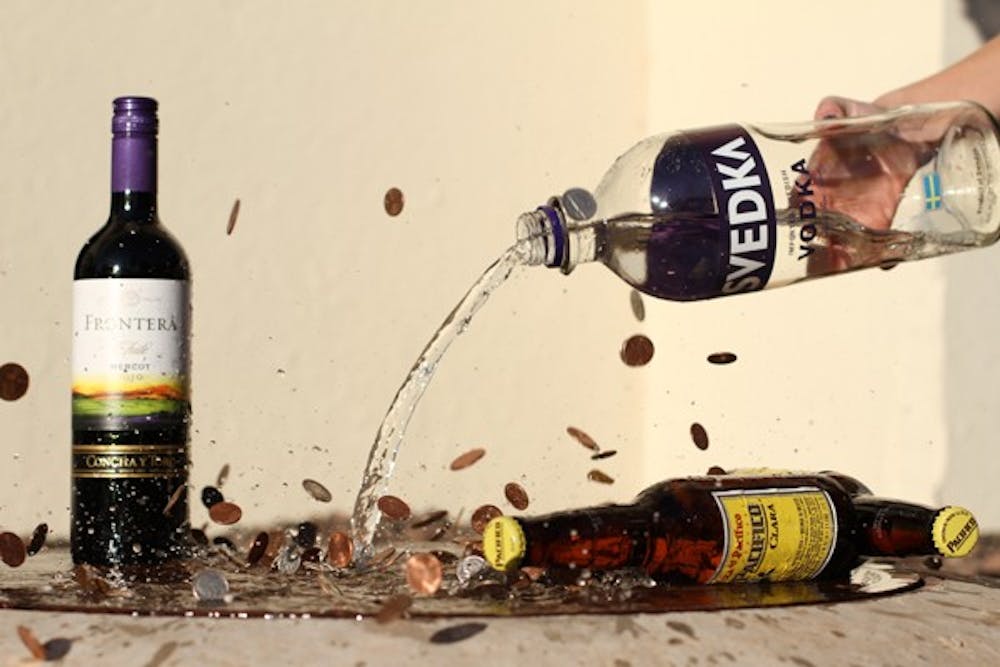Arizona voters may have the chance in November to pass a recently proposed state alcohol tax whose revenue would fight underage drinking.
The Alcohol and Substance Abuse Prevention and Early Intervention Health Initiative proposes a tax of 25 cents on a gallon of hard liquor and a dollar tax on a gallon of beer and wine.
Pennies For Prevention Chairman Manuel Medina filed the initiative with the Arizona Secretary of State Jan. 17.
Arizona has a tax of $3 on a gallon of spirits and 16 cents on a gallon of beer.
The wine tax in Arizona ranges from 84 cents to $4 per gallon, based on the wine’s alcohol content.
The proposed tax would be added to the current alcohol levies emplaced by the state.
In the initiative’s proposal, Medina said the new tax would increase the price of a drink by an average of 10 cents.
Passing the initiative would mean a standard 750 milliliter bottle of vodka marketed to sell at $16.99 after taxes will cost an estimated $17.09 after taxes, according to Medina’s estimations.
He predicted the tax would raise $100 million for community programs dedicated to preventing substance abuse by Arizona youth.
“(The initiative) will provide a sustainable funding source for research and community-based prevention,” Medina said in his proposal.
According to a 2006 study conducted by the Pacific Institute for Research and Evaluation, Arizona spends $1.3 billion alone on motor vehicle accidents, crime and substance abuse treatment correlated to underage drinking.
If the initiative is passed, the money raised by the tax will be allocated among community programs and resources focused on alcohol prevention and intervention with Arizona youth.
Public service and policy senior Emily Broome said the proposed initiative will help fight underage drinking in Arizona by providing more educational resources for youth dealing with alcohol dependency.
“The best way to prevent underage drinking is through education,” she said. “We need to educate our youth on the dangers of drinking and what it can lead to.”
Broome, the former president of ASU’s DPC Aware, a group dedicated to educating students on common wellness issues, said if the initiative passes, it will benefit ASU students by providing more resources and programs.
Nicole Nevarez, biological sciences junior and activities chair of the Health and Counseling Student Action Committee at ASU, said the proposed tax might affect students’ ability to purchase alcohol if they are “strapped for cash.”
“This new tax on alcohol might decrease the amount of alcohol ASU students purchase,” Nevarez said. “On the other hand, some students might be willing to spend that extra dollar when buying alcohol.”
HCSAC vice president and kinesiology sophomore Megan Wittenberg said the proposed tax would hinder the amount of alcohol purchased by ASU students to some extent.
“I don’t think it’s realistic to expect the purchasing of alcohol to stop all together,” Wittenberg said. “However, it is an excellent utilization of the profits to be turned into a countering action on alcohol consumption.”
In its proposal, the initiative establishes an 18-member commission that will determine its policy and procedure.
Five members will either be directors or deputy directors from state departments such as the Arizona Department of Health Services and the State Department of Corrections. These members will be non-voting members.
Three members of the commission will be tribal representatives and will hold voting power along with the other 13 unspecified members.
Proponents of the initiative have until July 5 to collect 172,809 signatures in order for the initiative to be placed on the November ballot.
Reach the reporter at aklee8@asu.edu.
Click here to subscribe to the daily State Press newsletter.





